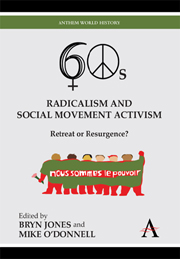Book contents
- Frontmatter
- Contents
- Introduction Sixties Radicalism: Creating Spaces and Leaving Legacies
- PART I Radical Movements Around the World
- 1 All Along the Watershed: Sixties Values as Defence of Community Lifeworlds in Britain 1968–2008
- 2 May's Tensions Today: France, Then and Now
- 3 The War Against the War: Violence and Anticolonialismm, in the Final Years of the Estado Novo
- 4 From Sartre to Stevedores: The Connections between the Paris Barricades and the Re-emergence of Black Trades Unions in South Africa
- 5 1968 – Was it Really a Year of Social Change in Pakistan?
- PART II Theoretical & Cultural Significance
- PART III Social Movement Legacies
- Conclusion
- Notes on Contributors
- Author Index
- Subject Index
1 - All Along the Watershed: Sixties Values as Defence of Community Lifeworlds in Britain 1968–2008
from PART I - Radical Movements Around the World
Published online by Cambridge University Press: 05 March 2012
- Frontmatter
- Contents
- Introduction Sixties Radicalism: Creating Spaces and Leaving Legacies
- PART I Radical Movements Around the World
- 1 All Along the Watershed: Sixties Values as Defence of Community Lifeworlds in Britain 1968–2008
- 2 May's Tensions Today: France, Then and Now
- 3 The War Against the War: Violence and Anticolonialismm, in the Final Years of the Estado Novo
- 4 From Sartre to Stevedores: The Connections between the Paris Barricades and the Re-emergence of Black Trades Unions in South Africa
- 5 1968 – Was it Really a Year of Social Change in Pakistan?
- PART II Theoretical & Cultural Significance
- PART III Social Movement Legacies
- Conclusion
- Notes on Contributors
- Author Index
- Subject Index
Summary
‘The new left worked to give life to politics as community…rejected the criteria of narrow efficiency, efficacy, compromise, discipline, of the “rules of the game”, as they are played in politics today.’
(Breines 1989, 151)Introduction
There is an influential historical consensus that 1960s radicalism in Britain had no significant or lasting impact on the social and political order. In this view, the longer-term effects of the ideas and movements, often associated with the climactic year of 1968, have been confined to popular culture, lifestyles and inter-personal relations. It is said that political institutions remained unperturbed and almost unaffected by the intellectual and ideological ferment occurring in the arts, media, universities, street politics and youth cultures. From this historical-empiricist perspective the significance of '68 in Britain was apolitical and confined to the personal and cultural sphere (Marwick 1998, 15–20; Sandbrook 2007, 543–5). Proponents of a revolution in society ended up changing little but their own life styles.
The present analysis examines sixties radicalism in Britain –and potentially more widely – as the fusion of counter-cultural and radical political ideas and movements that came together in the late 1960s to challenge the ruling socio-political order. It will critique ‘culturalist’ interpretations of this radical upsurge – as confined principally to life styles and sub-cultural institutions – on two grounds. Firstly, that the critical feature of the cultural upheavals of the high 60s, acknowledged by virtually all commentators, was not the immediate establishment of distinct and operational values.
- Type
- Chapter
- Information
- Sixties Radicalism and Social Movement ActivismRetreat or Resurgence?, pp. 3 - 22Publisher: Anthem PressPrint publication year: 2010
- 3
- Cited by



